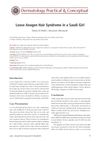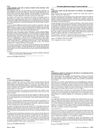 May 2009 in “Hair transplant forum international”
May 2009 in “Hair transplant forum international” Androgens affect hair growth and shedding, with genetic and non-genetic factors influencing baldness.
 111 citations,
March 1951 in “Annals of the New York Academy of Sciences”
111 citations,
March 1951 in “Annals of the New York Academy of Sciences” Understanding the mouse hair cycle is crucial for cancer research.
 14 citations,
January 2020 in “PloS one”
14 citations,
January 2020 in “PloS one” Timing of light therapy affects horse coat growth, with photoperiod being crucial.
9 citations,
September 2013 in “Journal of histochemistry and cytochemistry/The journal of histochemistry and cytochemistry” Matriptase is highly active in hair follicles and sebaceous glands, especially during hair growth phases.
Different genes and pathways are active in yak skin and hair cells, affecting hair growth and immune responses.
 January 2025 in “Clinical Cosmetic and Investigational Dermatology”
January 2025 in “Clinical Cosmetic and Investigational Dermatology” Pediatric alopecia areata is more immune-active than adult cases, suggesting age-specific treatments and potential use of JAK inhibitors.

Tiny particles called extracellular vesicles show potential for improving skin health in cosmetics, but more research is needed to confirm their safety and effectiveness.
 March 2023 in “International Journal of Biomedicine”
March 2023 in “International Journal of Biomedicine” Hair loss from Telogen Effluvium can be managed by treating the underlying cause and may improve with treatments like minoxidil.
January 2022 in “Journal of Cosmetics, Dermatological Sciences and Applications” The serum increased hair density and was well-tolerated, but didn't affect hair thickness or shedding.
 19 citations,
January 2016 in “Biological & Pharmaceutical Bulletin”
19 citations,
January 2016 in “Biological & Pharmaceutical Bulletin” Sargassum muticum extract and its component apo-9'-fucoxanthinone may help hair growth and treat hair loss.

Cornification is the process where living skin cells die to create a protective barrier, and problems with it can cause skin diseases.
 88 citations,
June 2009 in “Cleveland Clinic Journal of Medicine”
88 citations,
June 2009 in “Cleveland Clinic Journal of Medicine” To manage diffuse hair loss, identify the cause, improve nutrition, remove triggers, and use specific treatments like minoxidil or finasteride.
 12 citations,
January 1984 in “Anesthesia & Analgesia”
12 citations,
January 1984 in “Anesthesia & Analgesia” Anesthesia and surgery can cause temporary hair loss, but hair usually grows back without treatment.
 3 citations,
April 2011 in “Expert Review of Dermatology”
3 citations,
April 2011 in “Expert Review of Dermatology” Male hair loss is caused by inactive hair follicle stem cells.
 January 2024 in “Biomedical journal of scientific & technical research”
January 2024 in “Biomedical journal of scientific & technical research” Vitamins A, B7, C, D, and E are essential for healthy hair growth and preventing damage.
 October 2021 in “Dermatology practical & conceptual”
October 2021 in “Dermatology practical & conceptual” A Saudi girl was diagnosed with Loose Anagen Hair Syndrome, a rare condition causing easy hair loss without scarring.
 214 citations,
March 1993 in “Archives of Dermatology”
214 citations,
March 1993 in “Archives of Dermatology” Telogen effluvium is a reversible hair loss condition that requires a detailed diagnosis and often resolves on its own.
 190 citations,
October 2002 in “The FASEB journal”
190 citations,
October 2002 in “The FASEB journal” Androgens may cause hair loss by increasing TGF-beta1 from scalp cells, which inhibits hair cell growth.
 121 citations,
May 2009 in “Journal of Ethnopharmacology”
121 citations,
May 2009 in “Journal of Ethnopharmacology” Eclipta alba extract may help hair grow similarly to Minoxidil.
 58 citations,
October 2001 in “Dermatologic Clinics”
58 citations,
October 2001 in “Dermatologic Clinics” Hair loss can indicate underlying systemic diseases and addressing these can sometimes reverse the hair loss.
 52 citations,
September 2018 in “International Journal of Molecular Sciences”
52 citations,
September 2018 in “International Journal of Molecular Sciences” Ginseng and its compounds may help hair growth and prevent hair loss, but more human trials are needed to confirm this.
 45 citations,
December 2018 in “Lasers in Medical Science”
45 citations,
December 2018 in “Lasers in Medical Science” LLLT promotes hair growth and improves hair density safely in men and women.
 29 citations,
August 2008 in “Current Opinion in Pediatrics”
29 citations,
August 2008 in “Current Opinion in Pediatrics” Hair loss in teenagers is hard to treat and lacks a cure, with some treatments available depending on the type of hair loss.
 29 citations,
January 1993 in “Dermatologic Clinics”
29 citations,
January 1993 in “Dermatologic Clinics” Certain medications and maintaining adequate iron levels can help manage women's hair loss.
 7 citations,
July 2018 in “Journal of Functional Biomaterials”
7 citations,
July 2018 in “Journal of Functional Biomaterials” A new anti-baldness patch effectively treats hair loss by blocking enzymes linked to the condition.
 5 citations,
January 2015 in “Current problems in dermatology”
5 citations,
January 2015 in “Current problems in dermatology” The document concludes that a thorough history, physical exam, and specific tests are crucial for diagnosing and managing hair loss effectively.
 5 citations,
October 2011 in “Small ruminant research”
5 citations,
October 2011 in “Small ruminant research” Goat hair growth and follicle activity change with the seasons and differ between males and females.
 5 citations,
March 2004 in “Journal of The American Academy of Dermatology”
5 citations,
March 2004 in “Journal of The American Academy of Dermatology” Patients with systemic lupus erythematosus and hair loss had non-scarring alopecia with fewer hair follicles, and direct immunofluorescence did not help identify lupus.
 4 citations,
January 2021 in “Skin appendage disorders”
4 citations,
January 2021 in “Skin appendage disorders” Trichodynia is a painful scalp condition not directly linked to the amount or type of hair loss and may involve psychological factors, with treatments showing mixed results.
 3 citations,
February 2008 in “Basic and clinical dermatology”
3 citations,
February 2008 in “Basic and clinical dermatology” Telogen Effluvium is a hair loss condition where treatment involves identifying and managing its triggers.



























